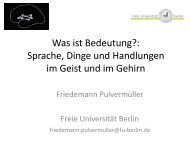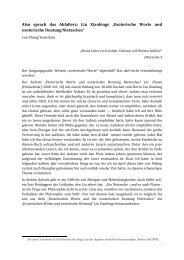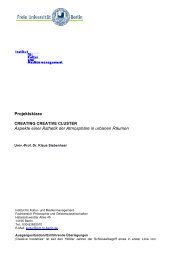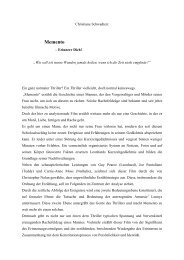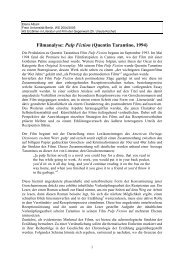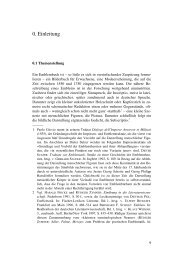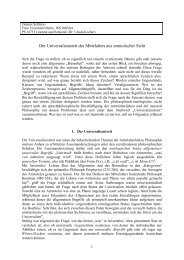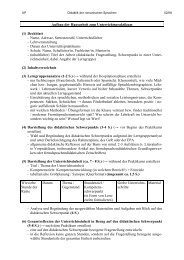nominalizations of french psychological verbs - Fachbereich ...
nominalizations of french psychological verbs - Fachbereich ...
nominalizations of french psychological verbs - Fachbereich ...
Create successful ePaper yourself
Turn your PDF publications into a flip-book with our unique Google optimized e-Paper software.
236<br />
JUDITH MEINSCHAEFFER<br />
(2) a. La lettre l’a déçue.<br />
“The letter deceived her.”<br />
b. #La déception de la lettre m’a surpris.<br />
“The deception <strong>of</strong> the letter surprised me.”<br />
It is argued that the grammaticality contrast in (1) and (2) is correlated with<br />
a difference in the semantic structure <strong>of</strong> the underlying <strong>verbs</strong>. It is further argued<br />
that the contrast can be explained by assuming that the realization <strong>of</strong> arguments,<br />
or better, <strong>of</strong> semantic participants, <strong>of</strong> derived <strong>nominalizations</strong> can be projected<br />
from the underlying semantic form <strong>of</strong> the <strong>verbs</strong> involved, drawing on three<br />
realization rules for semantic participants <strong>of</strong> <strong>nominalizations</strong>. The discussion is<br />
restricted to <strong>psychological</strong> <strong>verbs</strong> and their derived <strong>nominalizations</strong>, because only<br />
within this semantic class we find <strong>verbs</strong> showing the same surface syntax and<br />
similar meaning, but presenting derived nouns contrasting crucially in how their<br />
semantic participants can be realized.<br />
The paper is structured as follows. Section 2 introduces some<br />
characteristics <strong>of</strong> <strong>psychological</strong> <strong>verbs</strong> and <strong>nominalizations</strong> in French. In section<br />
3, a number <strong>of</strong> descriptive generalizations about the realization <strong>of</strong> semantic<br />
participants in <strong>psychological</strong> <strong>nominalizations</strong> are presented. Section 4 explores<br />
the difference between classes <strong>of</strong> <strong>psychological</strong> <strong>verbs</strong>. In section 5, semantic<br />
representations for three classes <strong>of</strong> <strong>psychological</strong> <strong>verbs</strong> are introduced. In section<br />
6, I propose three participant-realization rules by means <strong>of</strong> which the descriptive<br />
generalizations stated in section 3 can be derived from the semantic<br />
representations given in section 5.<br />
2. Psychological <strong>verbs</strong> as a semantic class<br />
By <strong>psychological</strong> <strong>verbs</strong>, we mean <strong>verbs</strong> denoting an attitudinal or emotional<br />
relation between two entities, where the precise nature <strong>of</strong> this relation is part <strong>of</strong><br />
the lexical meaning <strong>of</strong> the verb. Examples are given in (3).<br />
(3) chagriner “grieve”, mépriser “scorn”, regretter “regret”, angoisser<br />
“afflict”, amuser “amuse”, étonner “astonish”, fasciner “fascinate”<br />
One constant property <strong>of</strong> <strong>psychological</strong> <strong>verbs</strong> appears to be that their semantic<br />
representation (on some level) includes an entity experiencing the attitudinal or<br />
emotional relation denoted by the verb; hence, these <strong>verbs</strong> are sometimes<br />
subsumed under the class <strong>of</strong> ‘experiencer <strong>verbs</strong>’. In the examples given in (4),<br />
the experiencing entity is realized as subject in (a), as direct object in (b), and as<br />
indirect object in (c).




